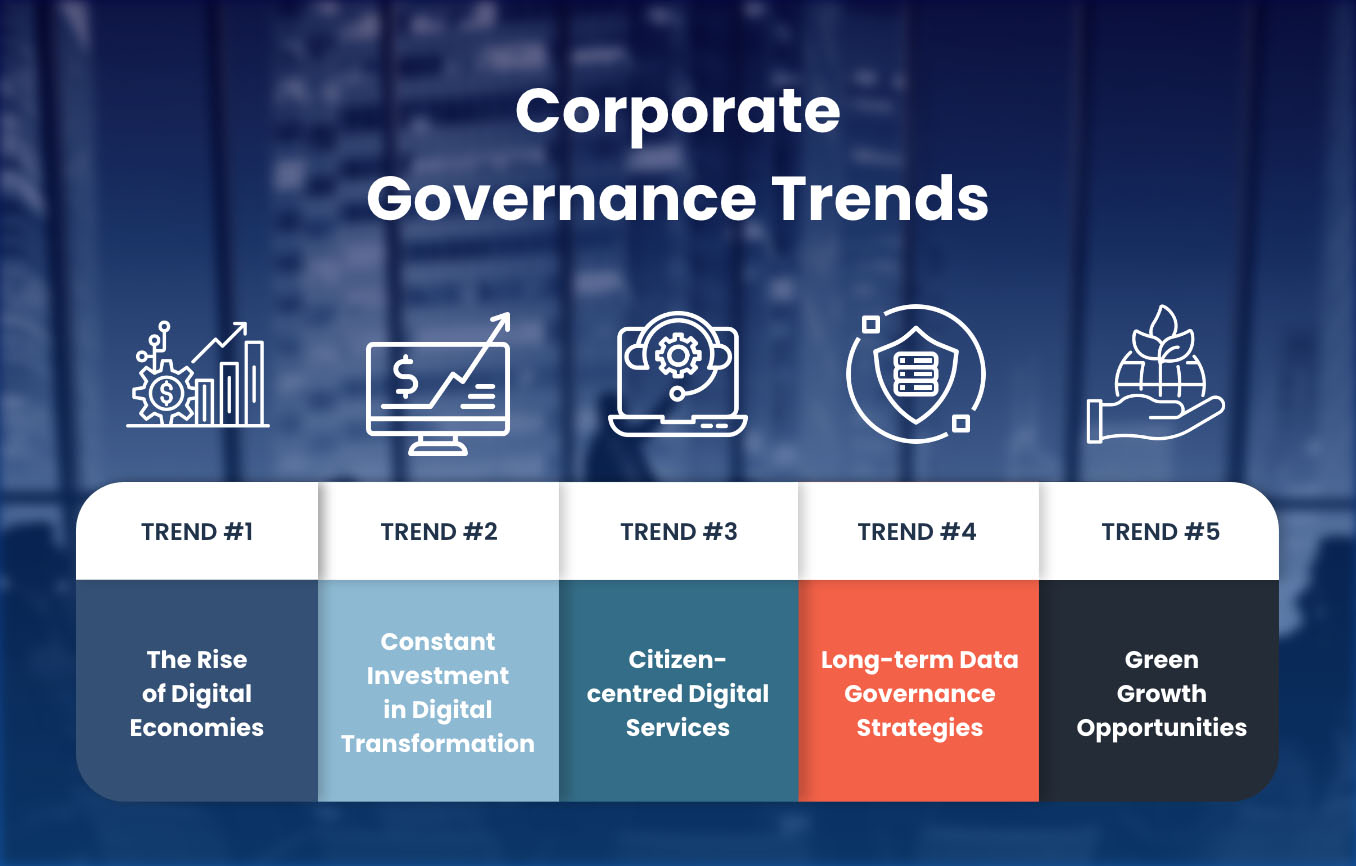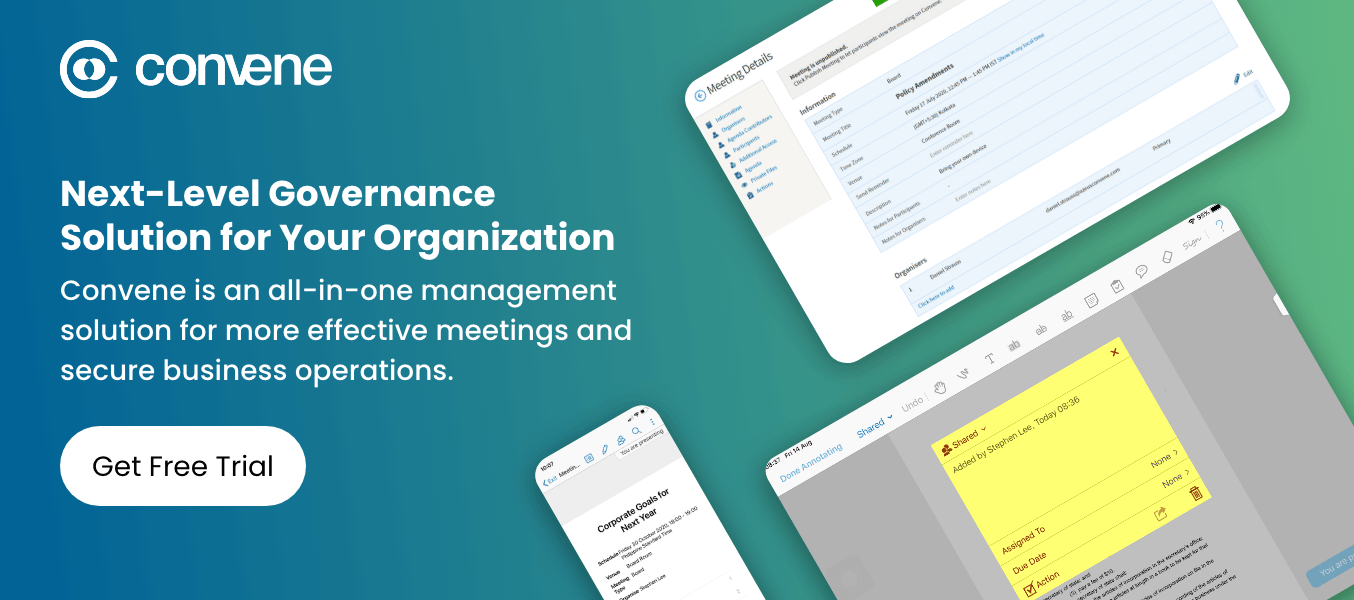In 2023, the global economy continues to face volatile threats due to recessions and inflationary pressures on both government and household budgets. According to the IMF, a third of the global markets will enter a recession this year.
However, the GCC region is expected to continue experiencing a period of strong growth due to its oil reserves and growth in the non-oil sector. The GDP growth rate for the GCC is expected to be at 3.6%, while the global growth average is only at 2.7%. According to Maroun Kairouz, Director for the Middle East and North Africa (MENA) at the World Economic Forum, GCC countries would experience the most negligible impact from the recession. GCC economies are also expected to perform well throughout the year, supporting businesses and building a more favourable labour market.
One strategy that can help businesses take advantage of the dynamic growth forecast is by keeping up with the latest business trends. Read below to learn more about the GCC governance trends for 2023 and how Convene can help you become a market leader.
Corporate Governance Trends

The Rise of Digital Economies
The COVID-19 pandemic has been a catalyst for businesses to have a digital paradigm shift. Having a robust digital infrastructure and being well-informed of the latest technology is necessary to stay relevant in the industry. Similar to the rest of the world, GCC countries integrated a digital-first strategy when the pandemic occurred. A digital-first strategy means favouring digitalisation options when executing a company’s products, services, channels, experiences, and processes.
More and more companies have realised that a digital-first strategy can bring in emerging technologies and digital options that can reduce operating expenses, enhance customer experiences, engage new customers, and boost their competitive advantage.
Cloud is also becoming the operating system of choice for digital businesses. By 2023, forecasts suggest that hybrid multi-clouds will become the standard, and improvements for cloud platforms are also expected to be expedited.
Constant Investment in Digital Transformation
Trends such as turbocharged digital transformation investments have emerged, and the pandemic has accelerated the need for digital investments. Thus, the region has placed an emphasis on digital transformation when making its economic and social development policies. Most GCC countries have also organised strategies and investments to achieve their digital initiatives.
Today, GCC governments continue to work toward digital transformation strategies. These include putting a focus on citizen-centred design for online services, reviewing more agile development processes, and preparing their workforce for the digital era. By 2025, more than 40% of regional ICT spending will go toward implementing digital transformation initiatives.
Citizen-centred Digital Services
The migration to the digital age of private enterprises has prompted the GCC governments to also restructure the scope and quality of their online services. Some examples of emerging public digital services include COVID-19 tracing apps such as Saudi Arabia’s Tawakkalna, the UAE’s Al Hosn, and Qatar’s Ehteraz, which were developed in 2020 to mitigate the spread of the disease. GCC nations also saw their Online Services Index, which measures the quality of e-government services, increase by 10% from 2016 to 2020.
The competition among businesses resulted in better digital services, setting the standards for the public sector to follow. Because of this, GCC governments are expected to strengthen their digital investments to provide more citizen-centred digital services to their people.
Long-term Data Governance Strategies
Data has become crucial to how world economies operate. As a result, GCC governments have started making longer-term investments in the governance and infrastructure needed to support a strong data strategy. Saudi Arabia and the UAE have also allocated a significant part of their budget to finance information and communications technology (ICT).
In addition, several GCC countries have enhanced their data security and controls. The MENA region expects end-user spending on data security to increase by 22.6% CAGR, from $70 million in 2020 to $129 million in 2023.
Green Growth Opportunities
The Middle East and North Africa (MENA) region, which is warming twice as fast as the global average, faces a major risk from the effects of climate change. Forecasts state that the temperature in the region can increase up to 4°C by 2050. The elevated temperature, together with food security concerns, droughts, and pollution, can make many areas inhabitable by the end of the century. Thus, many nations have incorporated climate commitment programmes and strategies to address these issues.
A green growth strategy is suggested to reduce carbon emissions. To achieve the region’s climate goals, nations have also enjoined the help of the private sector. Business leaders are enjoined to embrace change, integrate transparent global processes, set clear targets, work with suppliers, raise consumer awareness, and collaborate with policymakers. Investors must have a thorough understanding of the challenges and opportunities that businesses and organisations face because of the rapidly changing geopolitical and socioeconomic landscape. Governments, businesses, and civil society should work together to fulfil their responsibilities to the environment.
In the recent Abu Dhabi Sustainability Week, leaders across the region have come together to discuss the need for climate solidarity and the importance of clean energy and innovation. This has encouraged nationwide commitment towards sustainable development to support the ongoing net-zero efforts.
Strengthen Your Competitive Advantage with Convene
Board management software, such as Convene, can help you engage and comply with the emerging corporate governance trends in the GCC region. Convene can help your organisation remain competitive and efficient by:
- Using a technology-based platform to streamline the meeting process.
- Communicating and collaborating through a digital system.
- Protecting data confidentiality with numerous security features.
- Reducing environmental impact by eliminating paper usage and distribution resources for board meeting packs.
Being updated with the latest governance trends is crucial for an organisation’s success. Explore Convene to learn more about how you can stay relevant today!
Wendellyne works as an SEO-Content Analyst at Convene. During her college years, she developed a passion for digital marketing, which motivated her to pursue it afterwards. She is currently creating SEO-driven content in the IT sector, writing about board portals, corporate governance, and emerging trends in the IT industry. She earned her Bachelor of Science in Business Management degree from De La Salle University.











